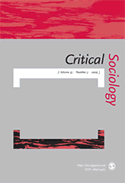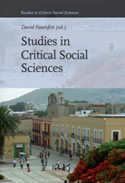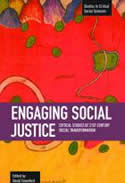Radical Education:
Progressive Graduate Programs
General Information
Heterodox Economics Education
A listing of graduate and undergraduate programs at an array of institutions, journals and other material. For general and updated information, look at the Heterodox Economics Newsletter, the most comprehensive newsletter in the world that deals with heterodox economics.
The Open University of the Left
Karl Marx's ideas are a common touchstone for people working for change. His historical materialism, his many contributions to political economy and class analysis, all continue to serve his core values--the self-emancipation of the working class and a vision of a classless society. There are naturally many trends in Marxism that have developed over the years, and new ones are on the rise today. All of them and others who want to see this project succeed are welcome here. Visit this online center for Marxist and progressive learning.
US Programs
The University of Tennessee Department of Sociology
The Sociology Department offers graduate study leading to the Master of Arts and the Doctor of Philosophy. The graduate program has concentrations in Criminology; Environmental Sociology, and Political Economy. Both the master's and the doctoral program allow for the construction of individualized programs of study. Students potentially interested are encouraged to contact a faculty member (see the list of faculty and their interests).
Loyola University Chicago Department of Sociology
The Ph.D. program in Sociology is designed to produce independent scholars able to research, teach or serve in a variety of settings. We offer comprehensive training in the knowledge and skills which constitute professional competence in the field. The curriculum is designed to equip students with a broad foundation in general sociology and in more specialized knowledge related to students' career interests in teaching, research, governmental work, or public service. Students potentially interested are encouraged to contact the Anne Figert (Graduate Program Director) afigert@luc.edu for more information.
The University of Kansas Department of Sociology
The Sociology Department is a vibrant community of about 50 graduate students and 20 faculty members. From our pool of applicants, we welcome 7-10 new students into the graduate program each year. Our Department is small enough to allow students to develop mentor-relationships with the faculty members while engaging in a rigorous program of study that focuses heavily on sociological theory, equips students in research skills, and allows them to pursue their interests in a variety of substantive fields. Students potentially interested are encouraged to contact the Shirley A. Hill (Director of Graduate Studies) hill@ku.edu for more information.
The University of Massachusetts Department of Economic
The UMass Amherst Department of Economics is a center for research and graduate education in a range of critical, radical, or otherwise heterodox economics. We have strength in development, feminist, labor, and environmental fields as well as in core areas such as Marxist and macro/financial political economy. Our grad program offers both Ph.D. and Master's. Students potentially interested are encouraged to contact the Michael Ash (department chair) chair@econs.umass.edu or the graduate program director gradinfo@econs.umass.edu for more information.
City University of New York, Graduate Center, Program in Sociology
The Ph.D. Program in Sociology develops sociologists of broad theoretical background who are trained in a mixture of research methods, from survey research to ethnographic, historical and comparative approaches. Students pursue studies in many areas of sociology, but given our location, we are strong in urban sociology, studies of race, ethnicity, and immigration, research on urban institutions, including schools, and on neighborhoods and urban spaces.
University of California Santa Barbara, Sociology
Our faculty members are among the best in the nation in the areas of gender/feminist studies, sociology of culture, economy and society, ethnomethodology and conversation analysis, global studies, race and ethnicity, social movements and political sociology, organizations, stratification, urban sociology, law and social control, religion and society, population and environment, networks, quantitative and qualitative methods, and sociological theory.
University of Montana, Department of Sociology
Our department has a master's degree with an option in Inequality and Social Justice. The Women's and Gender Studies program also has a graduate certificate. Political economy is incorporated in several of classes. Some faculty emphasize Marxism in their classes and Feminism is a given.
University of Missouri-Columbia Department of Sociology:
1) Political and Economic Institutions, and Social Movements; 2) Social Inequalities
The first area is centrally concerned with power in and around the institutions and processes, and with the cultures of institutions and movements that shape the exercise of power. Representative research and theoretical concerns within the area include power structures and comparative institutional arrangements; cultural frameworks shaping institutions and social movements; comparative studies of revolutions; and mobilization of resources, strategies, ideologies, and effects on institutional arrangements. The second explores the origin, structure, reproduction, and outcomes of social inequality arising from various sources: class, gender, race and ethnicity, age, global economy, etc.
Virginia Tech, Department of Sociology
The offers Master of Science and Ph.D. graduate degrees with concentrations in areas related to quality of life, inequality, and work and technology. In addition, students may choose a specialization in Africana Studies or in Women's and Gender Studies.
International Programs
Uppsala University, Sweden
Digital Media & Society, a specialization within the Master's Programme in the Social Sciences, offers students advanced tools to understand and analyze how digital media are shaping and being shaped by the economy, politics, and culture in contemporary society. For more information, please contact Lars Falting at lars.falting@ekhist.uu.se
City University London (UK) MA Global Political Economy
This new MA provides a contemporary take on the analysis of global economic relations, the workings of the global financial system, state strategies and processes of regulation. You will develop an in-depth understanding of how the economic system works and address critical issues in international development and policy-making. For more information, please contact Luke Bartrop at Luke.Bartrop.1@city.ac.uk
University of Nottingham (UK) Centre for the Study of Social and Global Justice
The Centre for the Study of Social and Global Justice (CSSGJ) was created to provide a focus for research and teaching in relation to the most fundamental question facing us as citizens: how should we live? Based in the School of Politics and International Relations at the University of Nottingham, CSSGJ offers a space for reflection, education and research in many different facets of social and global justice. CSSGJ offers an MA Social and Global Justice which focuses on perhaps the most relevant political question of our times: how should we live as global citizens? CSSGJ welcomes PhD research proposals that concern issues of social and global justice. For more information about areas of supervision, and the application process visit our research degree pages. If you require any information about the MA or PhD in the Centre for the Study of Social and Global Justice and if you would like to receive our brochures, please contact cssgj@nottingham.ac.uk
Plymouth University (UK) Program in Culture, Theory, Space
This cluster produces advanced inter-disciplinary research in two, linked and overlapping areas: theories and histories of culture and society in the modern and post-modern periods; and critical cultural practices in changing urban situations. It operates at the levels of post-doctoral research, doctoral study (MPhil/PhD), and post-graduate study (MA, MRes).
Kingston University, London (UK) MA Political Economy
The Economics (Political Economy) MA gives students an opportunity to receive a broad-based education for dealing with the economic, social political issues of the day without sacrificing the detailed technical specialisation offered by an MA in economics. It can lead to a range of career opportunities in a variety of areas: research institutes, non-governmental organisations (NGOs), public service providers, local and central government, and consultancy units.
Kingston University, London (UK) MA Philosophy, Politics, Economics
The Philosophy, Politics and Economics MA builds on advanced-level modules in the disciplines of philosophy, politics and economics and integrates them into a co-ordinated but multi-faceted programme. Critical as well as orthodox approaches are examined in all three disciplines, and across disciplines. The course is designed to highlight the advantages of critical and interdisciplinary approaches to contemporary issues. As such it is ideally suited to prepare students for doctoral study and for modern working environments.
University of Kassel (Germany) M.A. Global Political Economy
The M.A. program is taught in English in an excellent intellectual and social atmosphere in a multinational group.
University of Kassel (Germany) M.A Labour Policies and Globalisation
The GLU Masters programme "Labour Policies & Globalisation" (LPG) started as a pilot course in Germany in October 2004. The one-year programme is part of a wider project to promote cooperation between trade unions and the research community and to strengthen the analytical and policy development capacity of trade unions. The curriculum was jointly developed by universities and trade unions from around the world with a focus on Global Challenges to Labour, International Labour Rights, Processes of Globalisation and Economic Responses to Globalisation.
The Global Labour University
These unique global programmes are jointly developed by universities and workers organisations from around the world and aim at those candidates who have experience with labour and social movements, and who are willing to assist organisations in these fields to engage more effectively in social dialogue, public debate, and policy implementation. Participants will analyse and discuss in a multidisciplinary fashion the challenges of globalisation from a labour and trade union perspective. The programmes offer a multi-cultural and multiregional environment with students and lecturers coming from developing, transition and industrialised countries.
Lancaster University (UK), Department of Sociology
The Sociology Department of Lancaster University is eager to welcome and support new PhD students interested in Marxist research, in particular in political economy. The Sociology Department is strong in Feminist studies and encourages all sorts of radical approaches. Students undertake research in political economy (both comparative and international, historical and theoretical, plus, of course, empirical research) from a Marxist / Critical perspective in a friendly and supportive multinational academic environment. Interested students should contact the Michael R Krätke, Chair of Political Economy, at m.kraetke@lancaster.ac.uk



